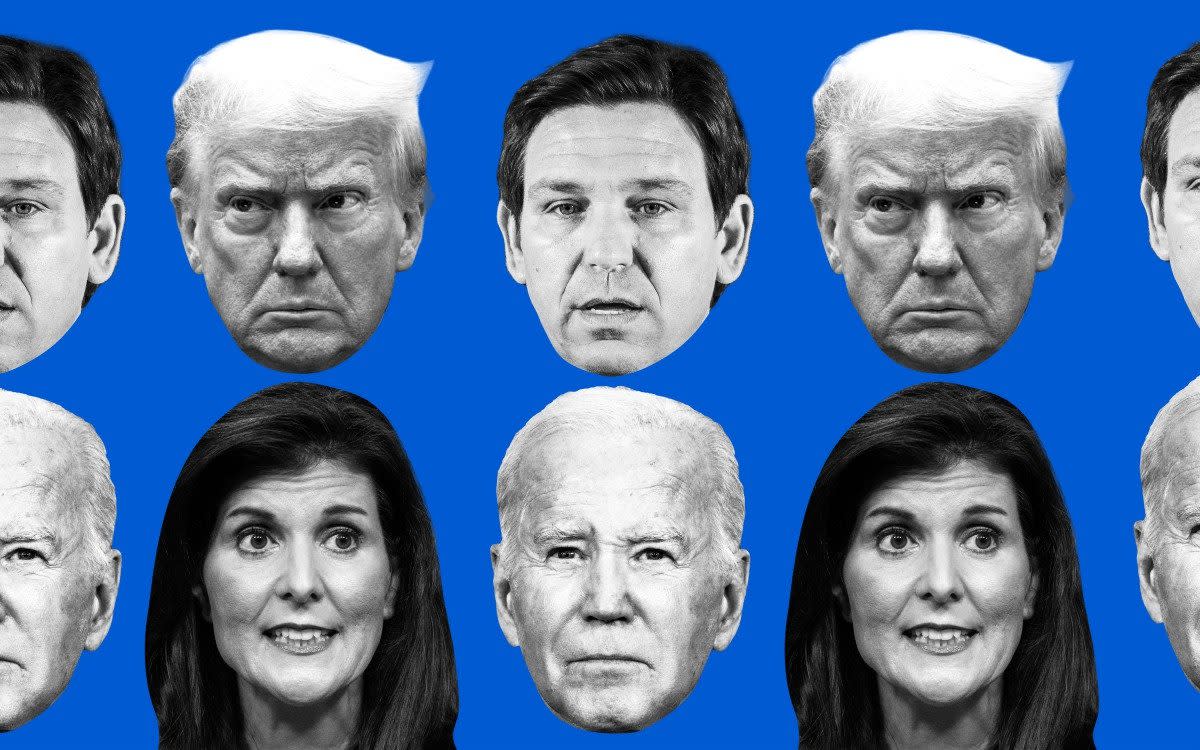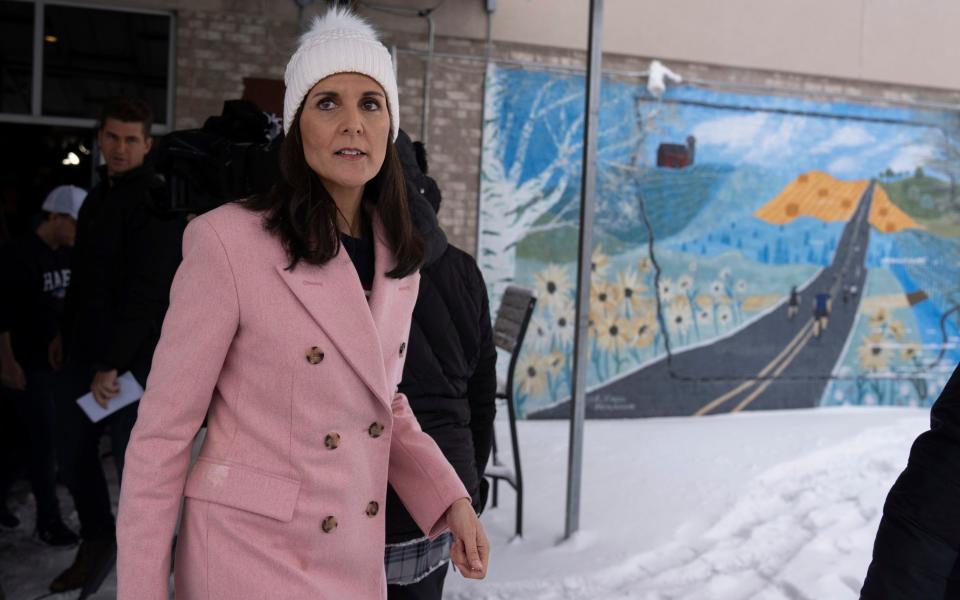What are the presidential primaries and why are Iowa and New Hampshire so important in 2024?


The two main candidates for the White House in 2024 will be picked through a series of state votes known broadly as primaries.
Starting in January with Iowa and New Hampshire, contenders will be whittled down gradually until one gains enough support to be named the official nominee for their party.
The final decision is confirmed in the summer at the Republican and Democratic party conventions, after which the general election campaigning begins in earnest.
What are the primary elections?
Primary elections are held by the main political parties to choose a presidential candidate.
Rules vary state by state. Connecticut, for example, has what is known as “closed primaries” which means that voters can only participate in the primaries held by the party for which they have registered.
Other states, such as Georgia, have “open primaries”, which means any registered voter can participate, regardless of their affiliation.
The primaries choose delegates who are sent to the parties’ national conventions.
Democrats will have around 3,900 voting delegates at their convention and Republicans 2,429.
In recent elections, the successful candidate has arrived at the convention with enough delegates to secure the nomination.
The last time this didn’t happen was in 1952. The Democrats, after much horse-trading, nominated Adlai Stevenson, who was drafted on the third ballot, after the other candidates failed to secure a majority.
Dwight Eisenhower also fell short on the first ballot but secured the nomination when delegates who had backed Harold Stassen switched to the wartime general.
How do they work?
Voters will either take part in a primary ballot or, in some states, attend a caucus.
The Republican rules are simpler. For the first batch of primaries, delegates are awarded in proportion to the number of votes cast.
After March 14, states are allowed to award all the delegates to the candidate who polls the most votes.
The Democrats share delegates in proportion to the number of votes cast. But there are also attendees known as “super delegates’’, who account for nearly 15 per cent of votes at the convention.
They are normally party officials, such as members of the Democratic Convention. Other superdelegates include governors and members of Congress.
What is a caucus?
Caucuses work differently. They are run by the parties themselves. They are held in locations across the state with supporters attending in person.
The meetings can last several hours.
Their purpose is to choose delegates who are “pledged” to vote for a particular candidate at the parties’ national convention.
While some caucuses do hold secret ballots, many rely on a show of hands, and in 2020, a mobile phone app was used.
The caucuses can be the scene of lengthy horse-trading, with campaigns trying to persuade attendees to switch their vote.
While the Republicans cast their votes by secret ballot, the Democrats work differently.
Voters are asked to form groups according to who they support or join a cluster who are undecided.
A candidate failing to win the backing of 15 per cent of attendees is eliminated and their supporters, along with the undecideds, are free to join another group.
Things do not always go smoothly, as the 2020 Democratic caucus in Iowa proved.
Problems with the mobile phone app and inconsistencies in the vote counting resulted in both Pete Buttigieg, the mayor of South Bend, Indiana and Bernie Sanders, the socialist senator from Vermont, both claiming victory.
Why is Iowa so important?
Iowa’s position in the election timetable gives the state disproportionate influence.
A poor showing in Iowa can deal a fatal blow to a candidate’s aspirations.
Kamala Harris dropped out after a poor showing in Iowa in 2020, having thrown everything she could at the state.
Despite holding 87 events in the states, voters were unconvinced – and so were donors.

“As the campaign has gone on, it’s become harder and harder to raise the money we need to compete,” she said in a video posted on her Twitter account. “In good faith, I cannot tell you, my supporters and volunteers, that I have a path forward if I don’t believe I do.”
In 2016, Kentucky senator Rand Paul called it quits after a poor showing.
Iowa almost dealt a fatal blow to Joe Biden who came fourth in 2020. He described the result as a “gut punch”.
He left Iowa with his campaign on life support and was rescued by the voters of South Carolina.
Conversely, a good performance can give a disproportionate boost to candidates and attract big money from donors.
Who will win?
Donald Trump secured an overwhelming victory in Iowa’s Republican caucuses, winning 51 per cent of the votes in the state.
Mr DeSantis and Nikki Haley were left battling it out for second and third place, securing 21.2 per cent and 19.1 per cent of the vote respectively.
DeSantis had gambled heavily on Iowa, a conservative state that he believes shares his values.
Never Back Down, his political action committee, spent $100 million in the state and knocked on more than half the homes in Iowa.
As things stand, Joe Biden looks certain to win the Democratic primary in the state too.
The latest polls place him far ahead of counterparts Dean Phillips, a Minnesota congressman, and Marianne Williamson, an author and spirituality guru, according to aggregator FiveThirtyEight.
What comes next: When is the New Hampshire primary?
On Jan 23, eight days after the Iowa caucus, New Hampshire holds its primary.
Ms Haley’s strong showing in the polls, eclipsing Mr DeSantis and, according to one survey, coming within four points of Mr Trump, has made the race more interesting than might have been expected.
The former president, who dubbed Ms Haley – his former UN ambassador “birdbrain” – dismissed the poll as a scam.
It is not unlikely at least one of the Republican candidates will drop out if they perform badly in both New Hampshire and Iowa.
A poor showing will make it harder to get donations and running for president is an expensive business.
New Hampshire’s position has been complicated by a spat between the Democratic National Committee and the state over whether the primary should take place.
The Democrats want South Carolina – the state which brought Mr Biden’s campaign back from the dead in 2020 – to go first.
But New Hampshire is refusing to cooperate, saying that the state’s first-in-the-nation status is enshrined in law.
As things stand, Democrat delegates will not be seated at the party’s convention, much to the disgust of Dean Phillips who is challenging Mr Biden for the nomination.
Throughout the year, states will hold primaries and caucuses, with the key date being March 5 – “Super Tuesday” – when 17 states and territories vote.
Republicans will hold their national convention in Milwaukee from July 15-18 and the Democrats gather in Chicago for three days starting August 19.
The presidential election takes place on November 5.

